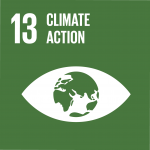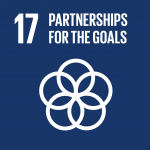Spotlight on Communities and Local Resilience at the 7th Asia-Pacific Climate Change Adaptation Forum
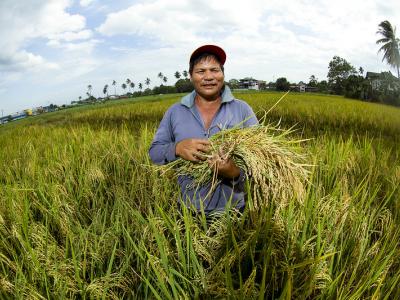
March 2021 - The 7th Asia-Pacific Climate Change Adaptation (APAN) Forum was held virtually March 8-12, 2021, under the theme Enabling Resilience for All: The Critical Decade to Scale-up Action. The 7th APAN Forum was hosted by the Ministry of Environment of Japan, together with the United Nations Environment Programme (UNEP). The forum was structured around four thematic streams focusing on: inclusive resilience; nature-based resilience; economic sector resilience and communities and local resilience. UNDP was privileged to lead the Communities and Local Resilience stream.
Five key takeaway messages from the Communities and Local Resilience Stream
- Local communities must be treated as leaders and partners in climate finance rather than beneficiaries.
- Inclusive, integrated and multisectoral approaches that involve communities from the beginning and provide opportunities for ownership are crucial to build sustained resilience.
- Adaptation and mitigation synergies can aid community and local resilience.
- Universities have tremendous potential to support and collaborate with communities.
- Traditional Knowledge and Ecosystem-based Adaptation (Eba) are complementary to scientific knowledge and can form the basis of locally driven resilience that meets local needs.
Coming together for Communities and Local Resilience
The five sessions held under the Communities and Local Resilience event stream convened 38 speakers, moderators and panelists from the community to international level to share their valuable expertise and diverse perspectives.
The stream kicked off with a session titled, “Linking adaptation and mitigation: The role of National Adaptation Plan (NAP) processes in Nationally Determined Contributions (NDC) implementation towards climate action for inclusive and enhanced local resilience in South and Southeast Asia” led by the Asia-Pacific Network for Global Change Research (APN). Drawing on case studies from 7 countries in South and Southeast Asia, this session explored lessons learned and challenges in linking Intended Nationally Determined Contributions (INDCs) and NAPs for local adaptation planning and enhancing resilience. Speakers highlighted that enablers, resilience champions and synergies between communities and other players at all levels can all support local level resilience.
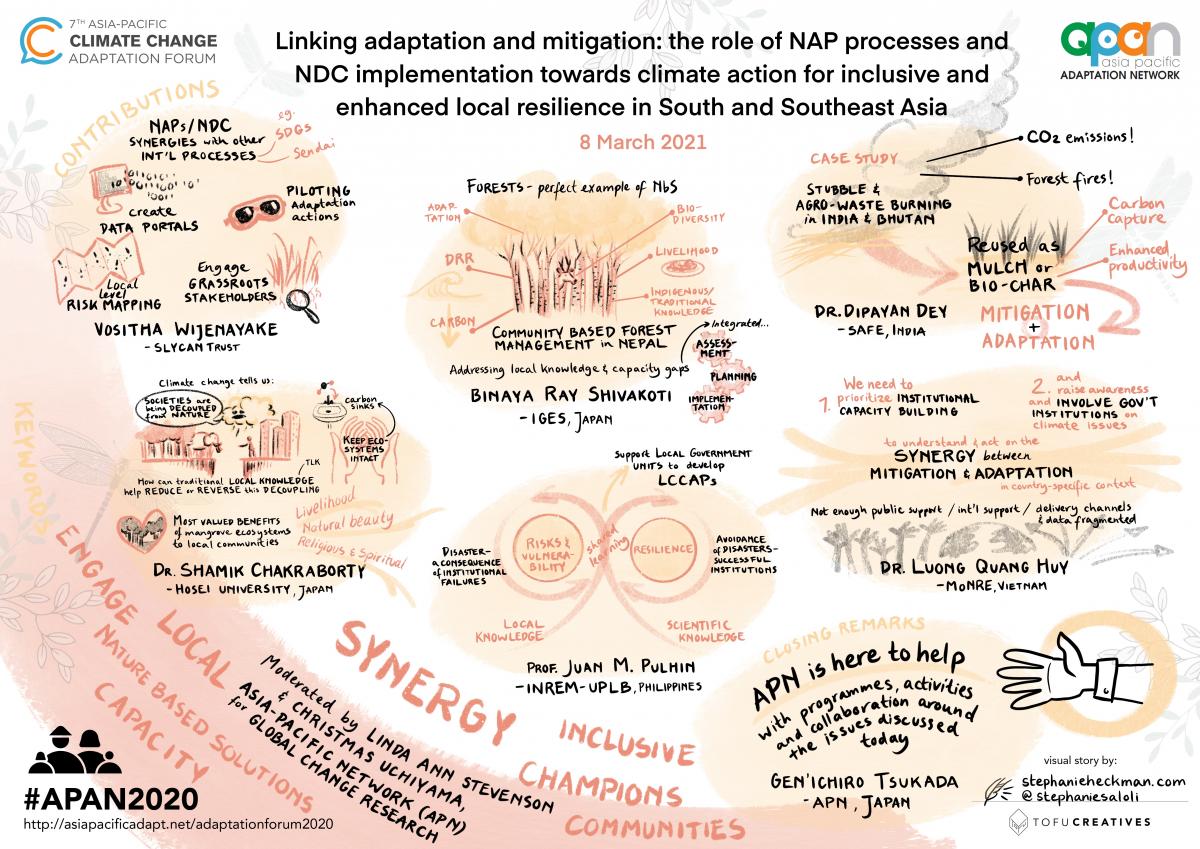
Led by the Asian Institute of Technology’s Regional Resource Centre for Asia and the Pacific (AIT RRC.AP), the session on “Collaborating Efforts to Strengthening Cities Resilience to Climate and Disaster Risks” included keynote speeches from Prof. Kazuhiko Takeuchi, the President of the Institute for Global Environmental Strategies (IGES) and Mr. Marco Toscano-Rivalta the Chief of the UN Office for Disaster Risk Reduction’s Regional Office for Asia and the Pacific. This session concluded that collaboration in cities can lead the way in strengthening resilience to climate change and disaster risks, prioritizing resource and finance mobilization, knowledge building and exchange, and capacity development.
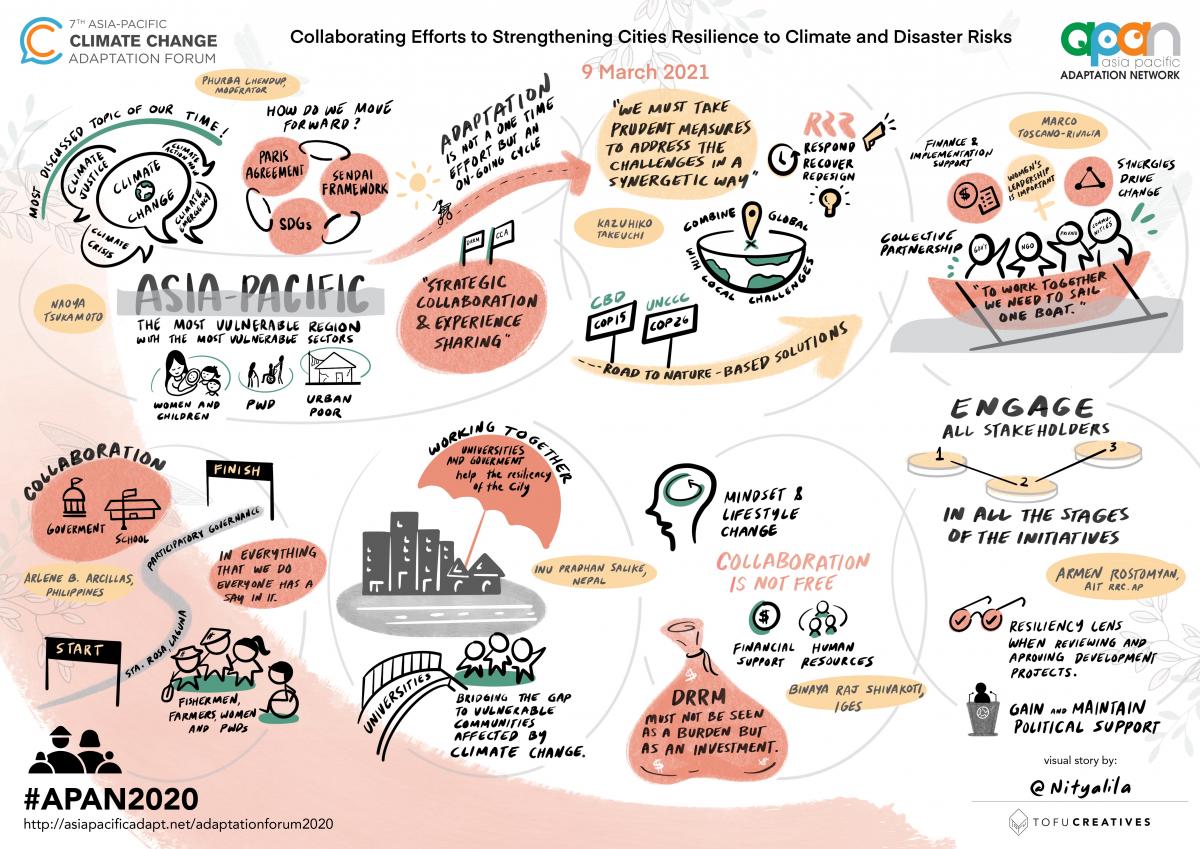
On the third day of the Forum, the International Centre for Climate Change and Development (ICCCAD) led the session “Toward Locally Led Adaptation: Fusion of Local and Scientific Knowledge and the Role of Universities in Strengthening Community Resilience.” Speakers discussed the complementarity of traditional and scientific knowledge and the role of universities in supporting community resilience, with moderation by Prof. Saleemul Huq, the Director at ICCCAD. To bridge the gap with communities, speakers described the personal motivation and heart researchers need.
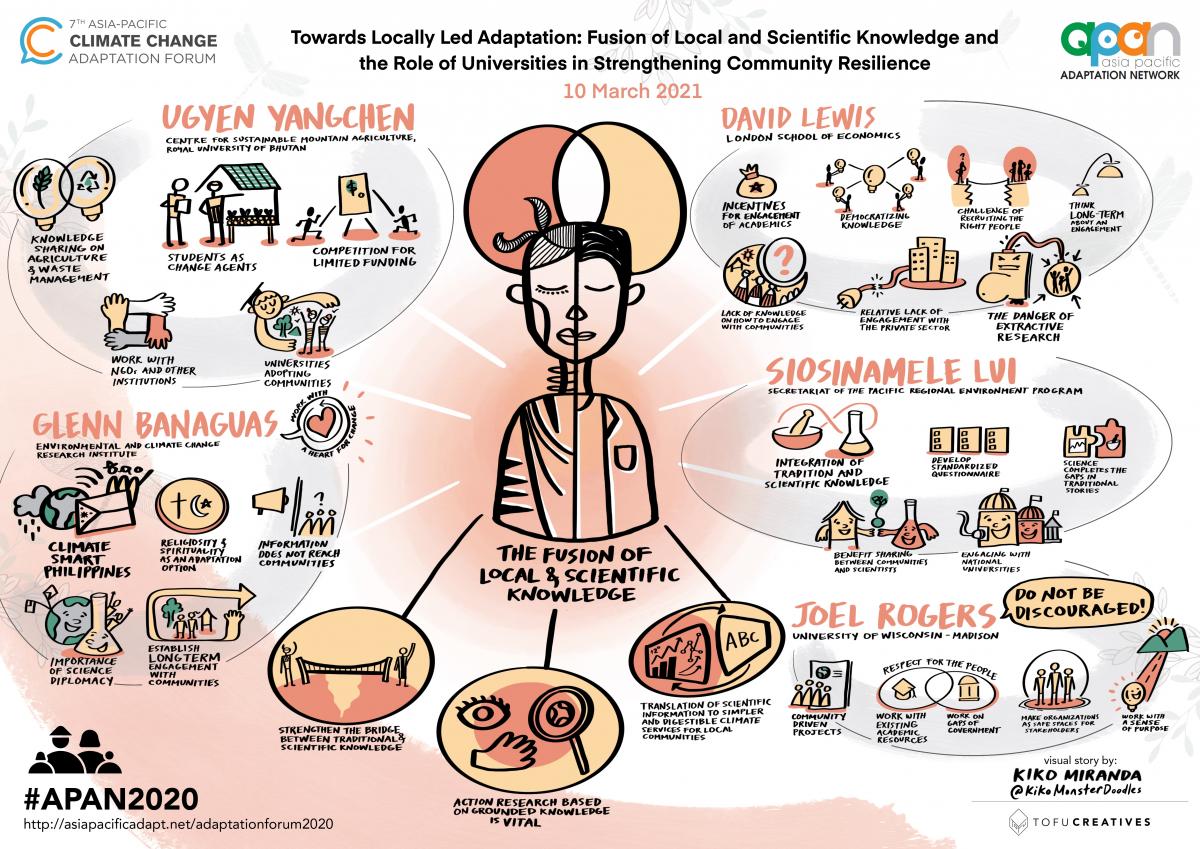
Adding an inclusive lens to the technologies and practices discussion, SLYCAN Trust led the session, “Inclusive Community-focused Adaptation Efforts for Sustained Resilience and Development.” This session explored best practices and challenges in existing technologies and practices for different water-based ecosystems. For example, speakers shared the necessity of ensuring that local communities have and retain rights and access to ecosystem resources, and take part in decision-making about how these resources are used.
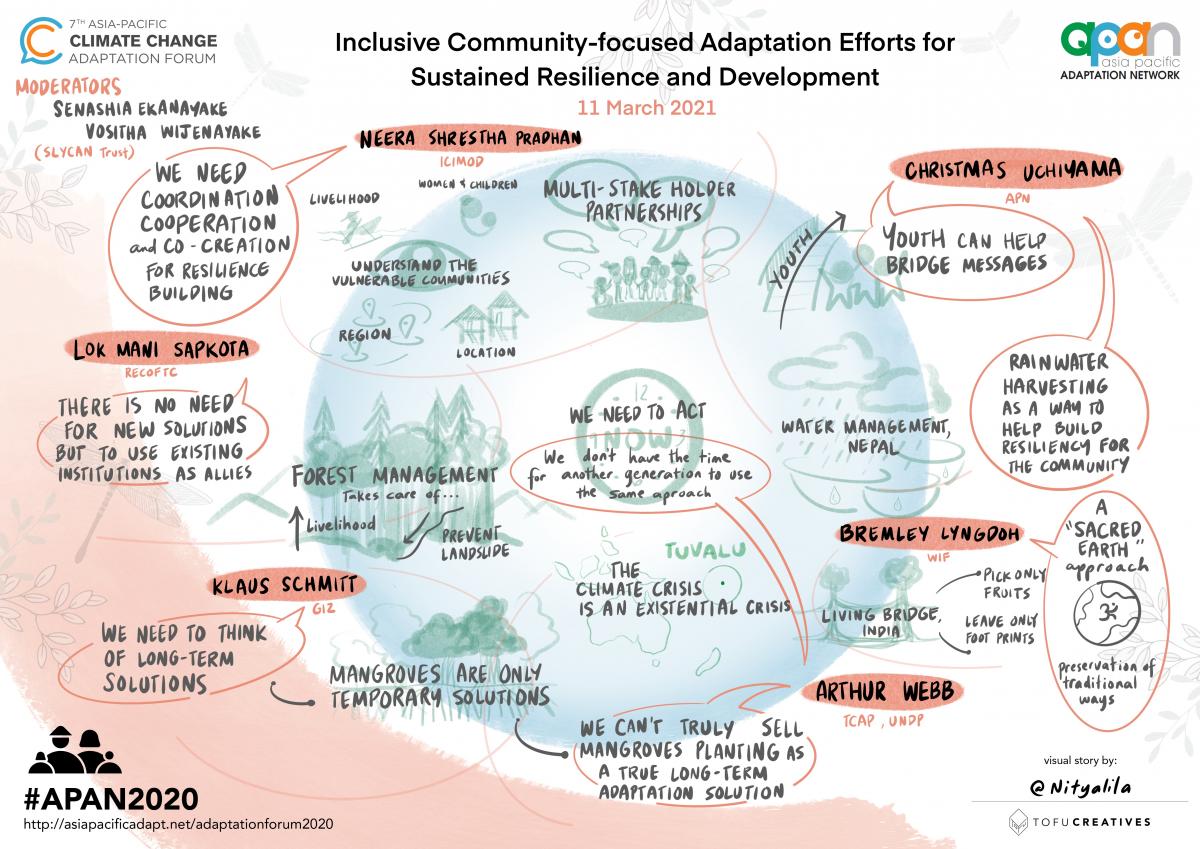
Ending the week with the topic on finance and investments, UNDP led the session on, “Partners not Beneficiaries - Empowering local communities as climate finance actors.” Speakers discussed issues in the current climate finance paradigm and how we can move forward, including recommendations for lengthened and more flexible climate finance to meet local needs.
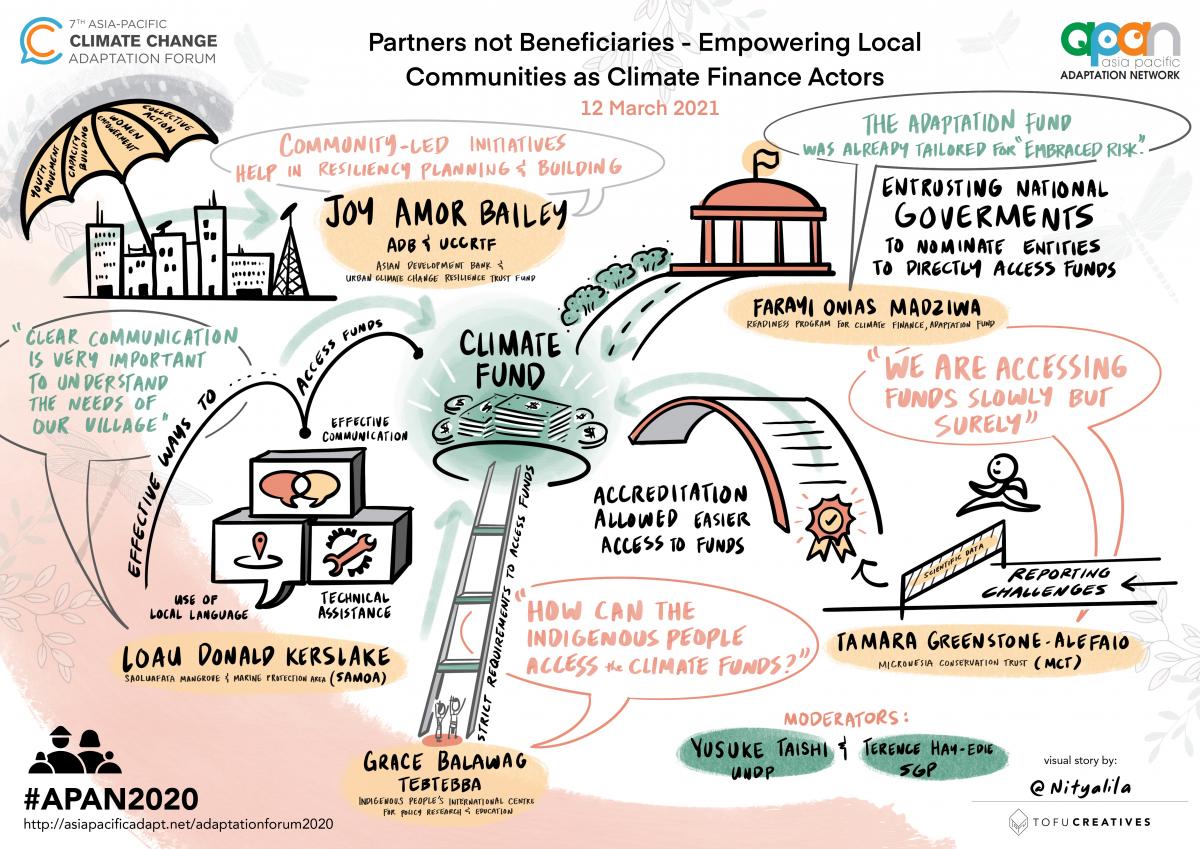
What are the main challenges for Communities and Local Resilience in the Asia-Pacific region?
The session discussions highlighted three themes of challenges for achieving local resilience at the community level.
There is a lack of capacity among communities overall to cope with extreme weather events, implement adaptation interventions, and access climate finance. Lack of capacity was described in terms of lack of technology, finance, resources, and technical knowledge.
For example, Loau Donald Kerslake, a community representative from Saoluafata Village Mangrove and Marine Protected Area in Samoa, described the lack of capacity and technical knowledge at the local level as a challenge for climate finance applications and reporting procedures.
Limited availability of data and technical information to inform action planning, policy development and baseline assessments remain challenging for communities and other local organizations. Climate projections and impact assessments are needed to inform planning and policy development, including to identify synergies between adaptation and mitigation efforts.
There can be a lack of recognition of local needs, experience, and knowledge. Traditional Knowledge is still often dismissed as irrelevant, without considering how it can contribute to local communities’ resilience in conjunction with scientific knowledge. National-level policies and financing often ignore the specific context and needs of the most vulnerable to climate change and extreme weather events at the local level.
Dr. Klaus Schmitt, Principal Advisor, GIZ Philippines, also explained that some solutions at the local level, such as strengthening dykes with sandbags or gabions, or planting mangroves, are temporary measures that do not address the root causes or long-term needs, especially when it comes to managing dynamic and complex ecosystems.
The pathway forward for Communities and Local Resilience
To address these challenges along with other issues raised, speakers discussed key approaches and actions to enhance community and local resilience.
Foster partnerships between communities and researchers to promote evidence-based resilience building. Speakers shared many real-world examples that can be used to inspire others. Ms. Ugyen Yangchen, shared how the Royal University of Bhutan connects students with communities to help introduce new innovations to farmers (e.g., waste management and composting techniques), while providing learning experiences for students.
Ms. Arlene Arcillas, Mayor of Santa Rosa City, described how the two-way relationship and collaboration between local governments and research institutions resulted in Santa Rosa City’s Comprehensive Land Use Plan and Local Climate Change Action Plan.
Amplify Traditional Knowledge and EbA for locally driven resilience. Mr. Shamik Chakraborty, Lecturer, Hosei University, described how his research is a collaboration with local communities to use Traditional Knowledge for landscape valuation, which is necessary for EbA and to make livelihoods such as fishing and crab collecting more resilient to climate change. Traditional Knowledge has insights that can help in climate change resilience; therefore, it can be used to inform policies and interventions.
Speakers emphasized the need for collaborative, multi-stakeholder approaches in assessing and building community resilience. National and regional governments, academia, NGOs and the private sector were all highlighted as potential partners for community and local adaptation efforts.
For example, Ms. Neera Pradhan, Senior Water and Adaptation Specialist, International Centre for Integrated Mountain Development (ICIMOD), described ICIMOD’s Community-Based Flood Early Warning System (CBFEWS) which provides near real-time flood warning and flood response guidance. Under the CBFEWS model, flood monitoring stations are designed and operated by communities, built by private sector partners, and coordinated with local government agencies and disaster response authorities.
Communities need to take ownership and be engaged in decision-making for resilience efforts to meet local needs and for projects to be sustained over a long period. Ms. Grace Balawag, Deputy Program Coordinator, Tebtebba, explained that in the context of access to climate finance “it’s really very fundamental to build clear ownership of Indigenous Peoples and local communities to these projects including the inclusive participation of women and young people.”
Further information
Read the Communities and Local Resilience Outlook for the Asia-Pacific region, developed in preparation for the APAN Forum, for further details on these topics.
Recordings of all APAN Forum sessions are available online.
Story by Stephanie Austin, Climate Promise – Climate Change Adaptation Consultant/UNDP with support from Melanie Pisano, Climate Change Communications Specialist/UNDP
